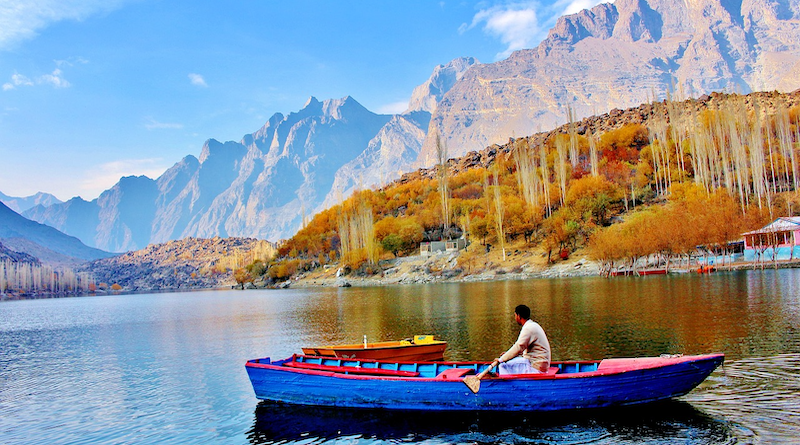Climate Change And Pakistan’s Way Forward – OpEd
By Dr. Sahibzada Muhammad Usman
As one of the top 10 most vulnerable nations on the Climate Risk Index, Pakistan is at the epicenter of climate change’s dramatic impacts. Rising temperatures, precipitous floods, and erratic weather patterns have led to a national security emergency. Pakistan must address this crisis strategically, drawing on various resources and collaboration to ensure a sustainable future.
One of the most significant impacts of climate change on Pakistan is its exacerbation of water scarcity issues. The country heavily relies on the Indus River system for its water supply, making it vulnerable to changes in the river’s flow patterns. Increasing temperatures and melting glaciers in the Himalayas have led to irregular water flow, threatening agricultural activities and the livelihoods of millions. As competition for water resources intensifies, interprovincial disputes over water allocation may escalate, potentially fueling conflicts within the country.
Climate change-induced crop failures and water scarcity have severe implications for food security in Pakistan. The nation’s predominantly agrarian economy heavily depends on a stable agricultural sector. Extreme weather events, such as floods and droughts, disrupt agricultural productivity and can lead to food shortages. The resulting food insecurity may push vulnerable populations to migrate, adding pressures to urban centers and potentially leading to social unrest. Pakistan is prone to various natural disasters, including floods, droughts, and cyclones, which are becoming more frequent and intense due to climate change. These disasters not only cause loss of life and property but also strain the country’s resources and infrastructure. Humanitarian response and recovery efforts often divert funds from development projects, affecting economic growth and exacerbating poverty and inequality.
As temperatures rise, the demand for cooling systems and electricity increases. Pakistan, already facing an energy crisis, experiences additional strain on its energy supply due to climate change. Hydropower generation, a crucial renewable energy source in the country, is threatened by irregular water flows, reducing the availability of clean energy. This leads to a greater reliance on fossil fuels, intensifying greenhouse gas emissions, and contributing to the vicious cycle of climate change. Infrastructure development in Pakistan may face significant challenges due to climate change. Increased frequency and intensity of floods and storms can damage roads, bridges, and buildings, disrupting transport and communication networks. Rebuilding and repairing infrastructure are costly, diverting funds from other essential sectors like education and healthcare.
As a signatory to various international agreements and protocols on climate change, Pakistan’s actions and policies are under scrutiny by the global community. How Pakistan tackles climate change and its commitment to reduce emissions can influence its diplomatic relations and partnerships with other countries. Moreover, climate-induced migration may lead to cross-border challenges, affecting relationships with neighboring nations. Climate change impacts exacerbate existing socioeconomic inequalities, creating potential sources of unrest and political instability. Food scarcity, resource competition, and displacement of communities can lead to social tensions and political discontent. To maintain stability, the government must adopt inclusive policies that prioritize vulnerable communities and build resilience against climate-induced challenges.
Recognizing the urgency of the situation, Pakistan’s Prime Minister has initiated a green transformation, reflecting in the nationwide effort to plant trees in coming years. This project aims to counter deforestation and restore the country’s depleted green cover, serving as a natural defense against climate change impacts. However, a more encompassing climate change policy is necessary to confront other contributing factors, including unsustainable agricultural practices, rapid urbanization, and industrial emissions.
To mitigate the adverse effects of climate change and foster sustainable and inclusive growth, Pakistan needs to prioritize several transitions, such as:
- The World Bank Group’s Country Climate and Development Report has called for fundamental shifts in development policies, emphasizing the need for people-centric climate adaptation and resilience. This shift demands significant investments that secure Pakistan’s economy and its people against future climate-induced disasters.
- Agriculture is the backbone of Pakistan’s economy, and climate change poses a severe risk to the sector. Transitioning towards sustainable farming practices is crucial for ensuring food security and boosting the country’s resilience against climate threats. This transformation should include innovative irrigation techniques, resilient crop varieties, and diversifying agricultural production.
- Urban planning needs to incorporate climate resilience as a central principle, particularly considering the risk of flooding. Infrastructure development should follow sustainable models, with emphasis on green buildings, efficient waste management, and urban greening.
- Given Pakistan’s heavy reliance on fossil fuels, it must accelerate its shift towards sustainable energy. Harnessing renewable resources like solar and wind can significantly reduce carbon emissions, supporting Pakistan’s efforts to mitigate climate change.
- Effective flood management strategies are critical in a country where floods are frequent and devastating. Investing in early warning systems, improving drainage infrastructure, and establishing robust emergency response plans can significantly reduce the impacts of flooding.
Climate change poses an existential threat to Pakistan. The path forward demands a comprehensive, multi-faceted response. With robust investment, policy shifts, and international support, Pakistan has the potential to build a resilient, sustainable future. These efforts are not only crucial for Pakistan but contribute to the global fight against climate change.

